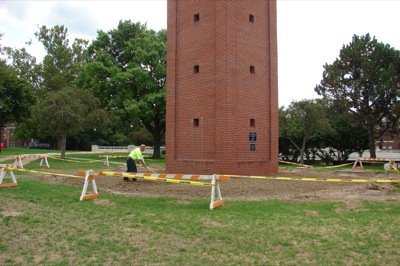Tuesday, September 1st, 2009
Customers could see new water fee
Council committee looking to cover unexpected shortfall
By Pat Royse
The bottom line in all Celina city utility funds is still in the black but projections in the months ahead, particularly for the water fund, are not so rosy.
Covering the expected water fund shortfall and building a small cushion for emergencies may mean another surcharge on customer water bills.
At a council of the whole committee meeting on Monday, Celina Safety Service Director Rick Bachelor presented financial charts on each of the city's three utility funds, prepared by the consulting firm of Sawvel and Associates.
"I want you to know what you are facing," Bachelor said. "I am not asking you to make a decision on this today ... We need to take into account that half of our plant was built in 1954."
Bachelor told councilors he sought some suggestions on how to address the low $260,000 current balance in the water fund. He wanted to know "what we need to do to cover the city's obligations" as well as some unanticipated expenses. The city needs a total $511,000 to meet upcoming obligations and bond debt payments in short order, he said.
Sawvel offered two suggestions. One would put a separate surcharge, labeled a Water Treatment Adjustment (WTA), on customer bills to pay for the cost of carbon used in the water treatment process. The carbon, which has to be replaced regularly, has doubled since the new Granular Activated Carbon (GAC) water plant began operating last summer.
The surcharge would cost the average family of four an additional $1.98 for every 1000 gallons per month, if approved.
The second suggestion would add pennies - or subtract pennies - to the existing GAC surcharge now on utility bills.
For example, the GAC charge for a 5/8-inch line is now $6.66 per month. The added cost would bring the charge to $6.70. A 1-inch line costs $8.50 now for GAC surcharge. It would go down to $8.47.
The GAC charge is tied to the $9.1 million obligation for the building of the water plant, which will not be paid off for 19 more years.
Besides the plant, the city owes money for the next 16 years on a $193,296 bond for the new water tower, a bond for the ozone project for five more years, two wastewater bonds and two electric fund bonds for three more years. All are borrowed at low interest rates, Bachelor told councilors.
Total loan obligations from the above projects total $15,569,269.
Council member June Scott told the group that this was not a good time to increase utility bills. Bachelor agreed but said it would be irresponsible not to meet the obligations to the community.
"We have to pay the bills," Scott agreed.
People could possibly reduce their bill by reducing usage, he said.
Council member Jeff Larmore said that the city has to raise enough funds to do some of the infrastructure work on water mains and other aging problems.
Bachelor urged the councilors to take the papers home, look them over and think about how best to solve the upcoming problem.

